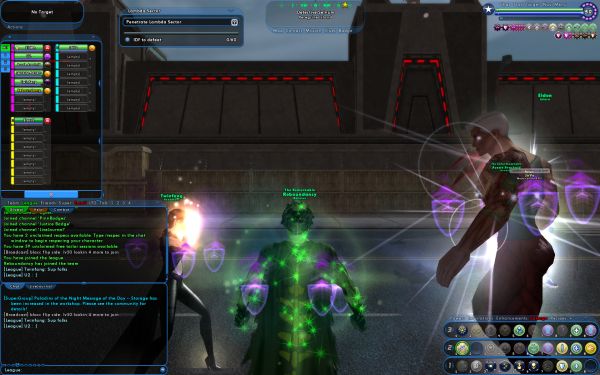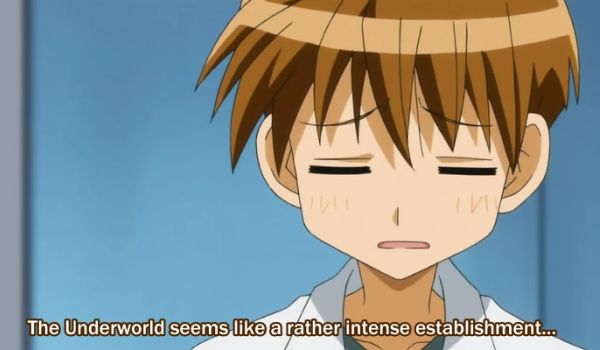
Screenshot from incarnate trial in City of Heroes/Villains, with new League overview on the left side of the screen.
Well, City of Heroes and Villains, I suppose, as these new “trials” are open for heroes and villains alike. Â I am happy to say that the Hero half of the game remains the more popular, though. Despite a number of competitors in recent years, the old CoX (as the double hero/villain game is often called) remains the king of the hill, and a major reason for this is ever new content included in the subscription fee.
City of Heroes, when new, was among the very first to use instances – basically pocket universes where a quest takes place independently of the rest of the world. Nobody except your team can come into that warehouse while you bust the drug shipment, effectively eliminating the problem of “kill stealing” that has plagued online games since the dawn of the genre. Â Today, instanced dungeons are taken for granted even in the sword & sorcery MMORPGs, but that was not usually the case.
Raids, on the other hand, have been around for a long time, and most other online RPGs have been more successful with them. Â Despite the unique rewards, the Hamidon raids in CoX only appealed to the hardcore players, which were rather a minority in this game. Part of it was that CoX is graphically intensive, with all the special effects you would expect from superpowers. But it is also hard to organize a large crowd. Until now, the largest fighting unit was a team of 8 players (plus pets, if any).
With issue 20, Paragon Studios introduce leagues: Â Basically teams of teams. You can have up to 48 players in a league, by filling up 6 teams of 8 players each. Teams retain the functions they have had before, but in addition you now get a league channel for discussing strategy, and a league display that shows the health and archetype of every member in the league, priceless for healers and useful for all. (Admittedly healers play a much lesser role in City than in traditional RPGs, but it is still nice to have them around, not least during extreme challenges such as these.)
The new trials are endgame content, and only available for those who have bought Going Rogue. (The expansion pack for City of Heroes, not the book by Sarah Palin, unfortunately. It would have been highly amusing if they had meant the latter.) Since this is only the second expansion pack in 7 years, the first being City of Villains, most players who stay around for a bit eventually buy it. There is a lot of content in the game after 7 years, and it is now possible to experience any and all of it through “flashbacks” even after you have reached the maximum level, so there is no pressure. It will probably take a year or two to get through it all, more if you have a job or a family or a religion or something.
Once you’re ready to take the next step, though, you need Going Rogue and a level 50 character. Â (The highest level in the game.) There is a tab on the standard interface marked LFG, and here you can sign up for either the Behavioral Adjustment Facility or Lamda Sector, or just take the first one that comes up, regardless of which. The latter is a good option for the fresh level 50 who has not yet unlocked his Alpha slot, as either of the two will contribute to that.
(Or her Alpha slot, as more than a third of the players of CoX are “grl in RL”, as the saying goes. Not very helpful for the desperate dater, as most of them came to the game by playing together with their husband or boyfriend.)
Anyway, what’s with this unlocking of slots? Well, you see, the level cap is still 50. Instead of gaining more levels, the more ambitious heroes are gaining Incarnate abilities, which allows for even more specialization than the game already has. For instance, already in Issue 19 you could unlock the Alpha slot, which lets you select a boost for all your powers. It could be more damage, or more accuracy, or more defense, or speed, or endurance. But you can’t have them all at the same time. There are some combinations, but not of the main benefits, and the more you specialize in one benefit, the less there is for others.
Issue 20 offers a whopping 4 new incarnate slots. Â One is a “proc”, a chance of adding extra effects to any of your attacks. One is an area damage that hurts your enemies, another is an area effect that strengthens your friends for a short time, and one is a controllable pet. Â Like the Alpha slot, there are numerous different effects to choose from, but you can only have one at a time in each slot. There are also different strengths, from common to very rare. And all of these are built from components that you get mainly through these two trials. (You can convert shards that you find during other content, but it is a slow process indeed.)
In addition to giving you components for building the various abilities, you also have to unlock them, and the only way to do this for the fabulous four is to do these trials repeatedly. To the best of my knowledge, there is no way around it. Each of the two trials unlocks two of the powers, gradually by means of a special incarnate xp. So you have to do them both, several times each, if you want to be one of the top dogs.
Needless to say, some people are less than in love with the notion of mandatory “grinding”, as RPG players call it when you do the same thing over and over. I suppose if you are a housewife, you get enough of that in Real Life! Some jobs too, I guess. So why pay for doing it in a game?
Well, in this case, because it is fun. Â If you use the game’s queue system, you will be thrown together with completely random heroes and villains in a fight to forestall an invasion of Earth. The only thing they have in common is that they are level 50. They will have very different powers, so you have to change your tactics for every time you do it. Â While I won’t say it is infinitely replayable, it is definitely replayable.
Once you have opened one or more of the incarnate slots, you can do any content in the game (except the player-made Mission Architect content, I believe) and gain a modest amount of  “Incarnate shards”, which can be converted to “Incarnate threads” and used to build content for the new power slots. So it is not like you actually need to do these trials hundreds of times if you don’t want to. You may, however, either because you like them or because you want to want to be the best there is at what you do. If so, knock yourself out. Actually, most likely your opponents will do that for you. These are not called trials for nothing! But even if you lose, you still get various good stuff from them. So I expect them to remain popular for quite a while. They certainly are now.







